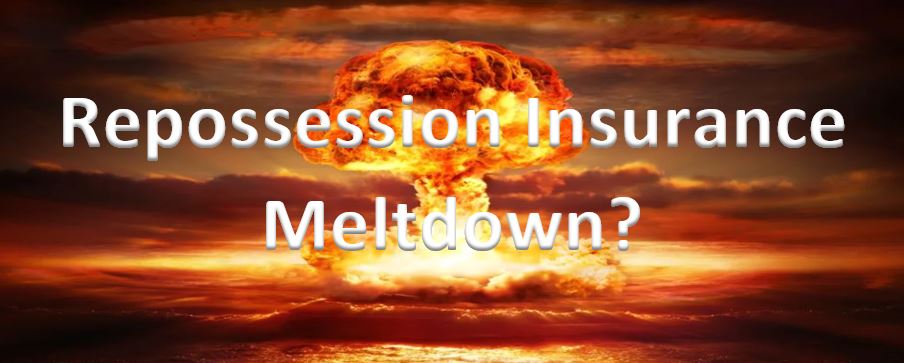
EDITORIAL
By now, everyone in the repossession industry is quite aware of the dire financial straits that the individual agencies are in. Years of low fees and eradicated ancillary fees have created an industry with little or no reserves to sustain themselves through this and there will undoubtedly, be agencies that simply do not return to operation. While everyone is hoping that the repossession moratoriums and shelter in place measures end soon, there is one lurking danger that could make such a resumption of operations impossible and that is skyrocketing or non-existent repossession Insurance..
When operations recommence, it is highly probable that there will be many repossession agencies that do not survive or simply choose not to come back to the repossession business given its current environment. For those fortunate enough to rise from this and resume operations, the obvious need to maintain their repossession insurance will be critical, but may not stave off the possibility of huge hikes in insurance premiums to come. With the reduction of repossession agencies, the pool of insured agencies will require that the anticipated and actual losses be carried by a smaller group that will also be facing additional headwinds of risk that the insurance companies must account for.
While repossession activities are at a veritable standstill, the exposure to litigation from pre-COVID-19 repossessions still exist. Claims involving repossessions filed within their statute of limitations that occurred long before the Pandemic still remain potential sources of loss for insurance carriers for an extended period of time. Financial hardships incurred during this shutdown period may encourage increased motivation to seek legal remedy for injuries sustained, real or perceived. Rest assured the insurance actuaries will be considering this as an additional risk.
The huge influx of breach of peace repossession lawsuits have been with us for many years now, and as repossession activities recommence, the probability of an increase of these increases with it. As consumer friendly as the courts have been in the past, public and judicial sentiment against the repossession industry is likely to become even more intense, which could result in higher frequency of legal actions and more costly damages against the defendant agencies.
Gun sales are at record levels and with that, the probability of a loaded gun coming into play grows with it. The general public has been developing a “survival” mentality, clearly demonstrative in now common place hoarding of staple consumer goods, such as toilet paper and dried goods and the growth in gun purchases illustrates their intent to protect themselves and their property.
Unfortunately, when the stays of repossession are lifted, millions of Americans, will be unemployed with little life savings if any, and feel that they are the victims of unforeseen circumstance, which they are. Right or wrong, they will develop an obvious “victim” mentality. The combination of a person holding a “victim” mindset pressed into a “survival” mindset creates a toxic environment that is exponentially more dangerous to agents in the field, that could result in higher incidents of death and injury, adding yet another potential rate increase in workman’s comp claims.
The problem is unlikely to be solved by the divine intervention of a larger insurance carrier, like AIG, Travelers or Progressive, as the repossession industry is too small for them to earn sufficient premium dollars in aggregate for servicing expenses, loss reserves and profitability. In the end, carriers may begin to “cherry pick” the agencies that they will provide coverage to in order to mitigate risk, which to a degree they have already been doing, showing preference to companies with larger fleets of vehicles to receive bigger premiums and commissions. Small companies with 1-3 vehicles may have even greater difficulty finding affordable coverage.
These are all very dark considerations, in light of everything else the industry is going through. And while the industry is at a standstill, this is the time to prepare yourself to be in the best position possible to assure that your agency is in the best position to demonstrate its worthiness should the insurance market tighten as it very well might. In the end, it may come down to those agencies who can demonstrate their dedication to safety and professionalism that rise to the surface.
Your agency could vastly improve its position by the following suggested measures, if you aren’t already;
• Raise deductibles on trucks and claims.
• Maintain high levels of compliance related driver training (defensive driver safety courses.)
• Federal and state statute training for all agents.
• The installation of onboard video cameras and audio to record accidents.
• Monthly safety meetings with meaningful content and follow up on action items.
• Keep vigilant maintenance logs on your tow equipment your equipment (tow lights, straps, dollies, etc.)
• Implement GPS tracking to ensure safe driving habits.
• Install governors or speed controls on tow trucks.
• Install telematic driver habit tracking to thwart bad behavior and reward positive behavior.
• Maintain progressive written disciplinary actions to terminate bad drivers and immediately avoid the risk.
While I can understand that all of these additional compliance measure require additional expenses, it is imperative that the industry comes to recognize that there will be no easy road ahead and that these expenses must be paid for. In order for this to be accomplished consistently across the industry, and to afford, what is extremely likely to be massive increases in repossession insurance, all agencies must adopt a business model to support this proactively. While it would preferable that every state have its own base minimum rates, old CFPB guidance would likely be cited claiming disparage treatment concerns.
At a minimum, a future base minimum repossession agency fee schedule needs to be established and that business model starts with a base minimum rate of $600 for an involuntary repossession and $350 for voluntaries with an addressing of ancillary fees.
Anyone who believes that once they emerge from this disaster, they can simply continue to function on $250- $325 contingent with no fees and sustain the impact of continued inflationary expenses as well as a possible shock to their insurance premiums, is sorely mistaken and will be digging their own graves at the expense of the rest of the industry. The old fees cannot be “made up for with volume” no matter how hard they try. The income to expense ratios will overwhelm them.
Over the decades, the industry has done this to itself with every little exception to their rules. Lenders, who care only about their repossession expense budgets and forwarders, doing their bidding while trying to underbid their competitors, will beg and demand that agencies return to their old pay schedules. They have to, they set their expense budgets on these 1989 prices and would rather see every agency in the country fail than to miss budget and not get their bonuses. Forwarders will be reluctant to ask for increases, because their competitors will be promising them that they can do it cheaper. But if the majority of the industry stands firm and refuses to work for less, they will not have sufficient geographical coverage in their networks to provide service and their flaccid results will illuminate the need for improvement.
This is not another one of my tirades on the forwarding industry. It’s not their faults. The fault lies in the hands of every agency that acquiesced to these demands. Demands that the forwarders are often merely the middle men in and are competing with each other over for the same handfuls of large national lenders. While people in the forwarding companies and other repossession service vendors may think that this doesn’t affect them, it most certainly does. A reduced pool of repossession companies could dramatically limit the forwarder agent networks and diminish their servicing capacity and a reduction in agencies equates a reduction in companies to subscribe to or purchase goods and services for the vendors.
With the potential for sweeping changes to the FDCPA and emergency provisions about to be proposed by congress, a very long repossession moratorium could occur. One which could devastate the industry and leave the majority of agencies out of their livelihood. While well meaning, the ramifications to bills, such as S. 3565 could cripple the auto lending, manufacturing industries along with the repossession industry. If you are a lender, please understand that this is as relevant to your livelihood as anyone else’s.
There has never been and never will be another time like now to raise the level of professionalism, profitability and image of the industry than now. It may sound difficult. It may be impossible for some. But the future of the industry is on your hands and anyone who crosses that line is no brother of the industry and is working counterproductive to fair and equitable work conditions, standards and safety of both agents and the public. Hold each other accountable, but stand united.










Facebook Comments